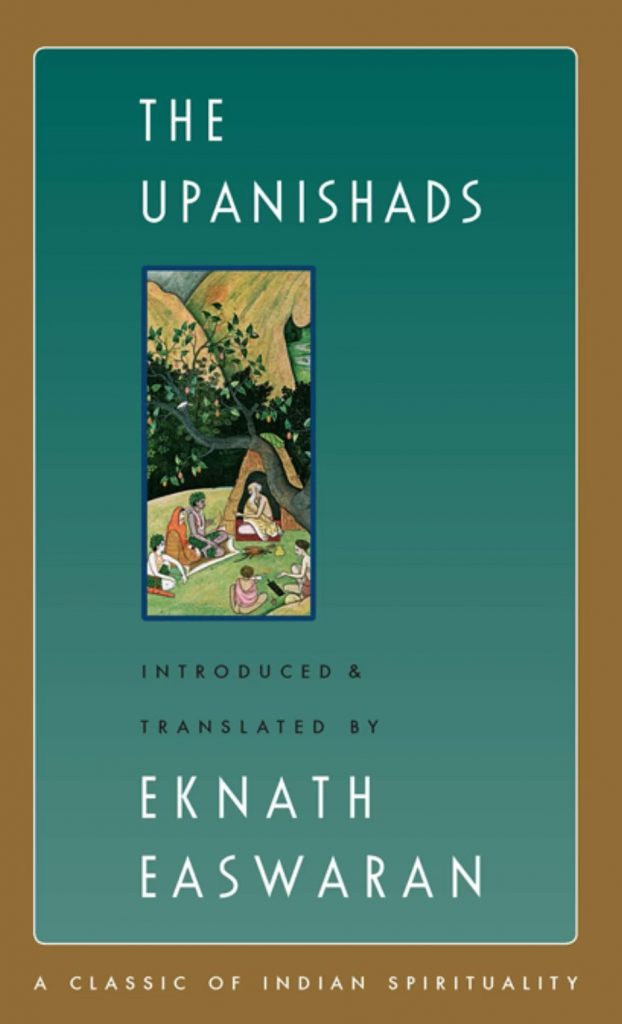
奥义书(Upanishads)是“吠陀文献”(Vedic literature)的最后部分,被认为是印度哲学(尤其是印度教)的核心基础。奥义书的核心内容是对“梵”Brahman(宇宙的终极实在)和“我”Atman(自我或灵魂)的讨论,提出了“梵我合一”(Brahman and Atman are one)的思想:这个世界的表象是多样和分离的,但在本质上,所有存在的事物都是相连的,并且都源自同一个终极实在。它提出了业(Karma)与轮回(Samsara)的概念,认为·个体的行为决定了未来的命运,包括生死轮回的经历。奥义书的终极目标是获得解脱(Moksha),超越生死轮回的束缚,实现与梵的合一。它·强调通过内在的反思和冥想来获得对自我本质的知识,超越表象,看到宇宙的真实本质。
The Upanishads, considered the concluding part of the Vedic literature, form the core foundation of Indian philosophy, especially in Hinduism. Their central focus is the discussion of “Brahman” (the ultimate reality of the universe) and “Atman” (the self or soul). The Upanishads introduce the concept of the unity of Brahman and Atman—despite the apparent diversity and separateness in the world, all things are fundamentally connected and originate from the same ultimate reality. They present the ideas of “Karma” (the law of action and consequence) and “Samsara” (the cycle of birth, death, and rebirth), emphasizing that an individual’s actions determine their future destiny, including their experiences within the cycle of reincarnation. The ultimate goal outlined in the Upanishads is to achieve “Moksha“ (liberation), which involves transcending the cycle of Samsara and uniting with Brahman. The Upanishads stress the importance of inner reflection and meditation to attain knowledge of one’s true nature, allowing individuals to see beyond appearances and grasp the true essence of the universe.
电子版代找请联系:yefei147852
电子版代找请联系:yefei147852

未经允许不得转载:我的生活分享 » 《The Upanishads》PDF+mobi+epub高清完整电子版

 《Afghanistan by James Willcox, Dana Facaros》PDF+mobi+epub高清完整电子版
《Afghanistan by James Willcox, Dana Facaros》PDF+mobi+epub高清完整电子版 《Strange Ways To Die in the Tudor Ages》PDF+mobi+epub高清完整电子版
《Strange Ways To Die in the Tudor Ages》PDF+mobi+epub高清完整电子版 《Microsoft Azure AI Fundamentals (AI-900) Certification Guide: Master AI, Machine Learning, and Azure Cloud Intelligence to Earn Your Microsoft Azure AI-900 Certification》PDF+mobi+epub高清完整电子版
《Microsoft Azure AI Fundamentals (AI-900) Certification Guide: Master AI, Machine Learning, and Azure Cloud Intelligence to Earn Your Microsoft Azure AI-900 Certification》PDF+mobi+epub高清完整电子版 《New Perspectives Microsoft 365 Access Comprehensive》PDF+mobi+epub高清完整电子版
《New Perspectives Microsoft 365 Access Comprehensive》PDF+mobi+epub高清完整电子版 《Data Compression: The Complete Reference 3rd Edition》PDF+mobi+epub高清完整电子版
《Data Compression: The Complete Reference 3rd Edition》PDF+mobi+epub高清完整电子版 《Fundamentals of Anatomy and Physiology, 5th Edition》PDF+mobi+epub高清完整电子版
《Fundamentals of Anatomy and Physiology, 5th Edition》PDF+mobi+epub高清完整电子版 《The Way of Excellence: A Guide to True Greatness and Deep Satisfaction in a Chaotic World》PDF+mobi+epub高清完整电子版
《The Way of Excellence: A Guide to True Greatness and Deep Satisfaction in a Chaotic World》PDF+mobi+epub高清完整电子版 《Forever for the Culture: Notes from the New Black Digital Arts Renaissance》PDF+mobi+epub高清完整电子版
《Forever for the Culture: Notes from the New Black Digital Arts Renaissance》PDF+mobi+epub高清完整电子版 《Fair Game: Trans Athletes and the Future of Sports》PDF+mobi+epub高清完整电子版
《Fair Game: Trans Athletes and the Future of Sports》PDF+mobi+epub高清完整电子版 《A Star Is Reborn: The Most Filmed Hollywood Story of Love Found and Lost》PDF+mobi+epub高清完整电子版
《A Star Is Reborn: The Most Filmed Hollywood Story of Love Found and Lost》PDF+mobi+epub高清完整电子版